Alumni engagement is a crucial aspect for educational institutions aiming to build strong, lifelong connections with their graduates. At Univariety, we recognise the importance of not just engaging alumni but doing so in a way that is meaningful and relevant to their current life stages. This is where alumni segmentation comes into play. By segmenting alumni based on age and career stages, we can create more personalized and impactful engagement strategies.
In this blog, we’ll explore why alumni segmentation is essential and how Univariety implements it effectively for better engagement and meaningful connections.
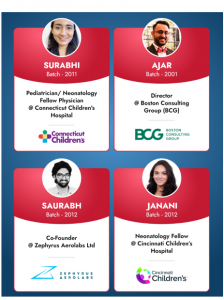
Why do We Need Alumni Segmentation?
Better & Personalized Engagement
Alumni are a diverse group with varying needs, interests, and life and career experiences. By segmenting them, we can tailor our communication and engagement strategies to meet their specific needs. This personalization makes alumni feel valued and understood, fostering a stronger connection with their alma mater.
Enhanced Relevance and Connection
When alumni receive content that resonates with their current life stage, they are more likely to engage with it. For instance, a recent graduate starting their career will have different interests compared to a senior manager with years of experience. Segmentation ensures that the content we share is relevant and timely, enhancing the overall connection between alumni and the institution.
Better Resource Allocation
Segmenting alumni allows institutions to allocate their resources more effectively. Instead of a one-size-fits-all approach, institutions can focus their efforts on creating targeted content and engagement activities that deliver higher returns in terms of alumni participation and support.
Our Alumni Segmentation Criteria
At Univariety, we segment alumni into two main groups based on their age and career stages: 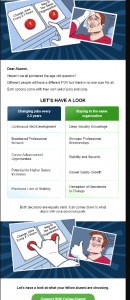
Above 26 Age-Group
This segment typically includes mid-level or senior managers who are millennials. These alumni have established their careers and are looking for content that supports their professional growth, offers industry insights, and provides inspiration.
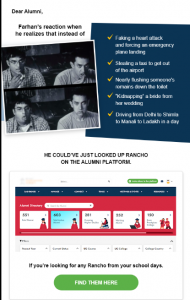 Below 26 Age-Group
Below 26 Age-Group
This segment includes college-going individuals or those who are just starting out in their corporate careers, primarily Gen Z. They are at the beginning of their professional journeys and seek content that offers career tips, academic advice, and insights into industry trends.
Engagement Strategies for Each Segment
Above 26: Mid-Level or Senior Managers (The Millennials) 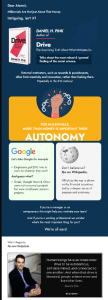
For this segment, our content focuses on themes that align with their career aspirations and life experiences. Here are some key strategies:
- Career Growth: Articles and webinars on leadership, skill development, and industry trends.
- Industry Insights: Newsletters featuring the latest developments in their fields.
- Humour: Light-hearted content that resonates with their generational humour and workplace experiences.
- Inspiration: Stories of successful alumni and motivational content that encourages them to stay connected and contribute to their alma mater.
Below 26: College-Going or Early Career (The Gen Z) 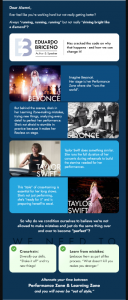
For the younger alumni, our content is tailored to address their immediate needs and interests. Key strategies include:
- Career Tips: Practical advice on job hunting, resume building, and interview preparation.
- Academic Advice: Guidance on further education opportunities and study tips.
- Industry Trends: Updates on emerging fields and career opportunities.
- Relatable Humor: Content that aligns with Gen Z’s sense of humour and current trends.
Univariety’s Approach to Alumni Segmentation
To effectively implement alumni segmentation, Univariety sends out weekly emails with various hooks designed to engage each segment. Our approach includes:
Knowledge-Based Content
We provide valuable information that helps alumni stay informed and grow professionally. This includes articles on industry trends, research findings, and expert opinions tailored to the interests of each segment.
Humor-Based Content
Humour is a powerful engagement tool, but it needs to be appropriate for the audience. For millennials, we incorporate workplace humour and relatable experiences. For Gen Z, we use memes and pop culture references that resonate with their generation.
Inspirational Content
Stories of successful alumni, motivational quotes, and content that inspires alumni to give back to their community are a staple in our engagement strategy. This type of content fosters a sense of pride and encourages alumni to remain connected with their alma mater.
Implementation and Best Practices
Implementing an effective alumni segmentation strategy requires careful planning and execution. Here are some best practices:
Data Collection and Analysis
Collecting accurate data on alumni is the foundation of segmentation. This includes demographic information, career details, and engagement history. Analyzing this data helps create precise segments and understand their needs.
Tailoring Content to Segments
Once segments are defined, the next step is to create content that caters to their specific interests and needs. This involves regular updates and feedback loops to ensure the content remains relevant and engaging.
Continuous Feedback and Improvement
Engagement strategies should be dynamic and adaptable. Regularly collecting feedback from alumni helps in refining the content and approach. Continuous improvement ensures that the engagement remains effective and impactful.
FAQs
Q. What is the concept of segmentation?
Segmentation is the division of a larger audience or group into smaller, more specific segments through common characteristics. You would then be able to tailor communication much more and meet their needs to encourage greater engagement and effectiveness.
Q. What is the goal of having an alumni group?
An alumni group aims to connect graduates with their alma mater; it encourages networking among alumni and promotes contributions by means of mentorship, events, and financial contributions. In short, it forges a stronger relationship between the institution and the alumni.
Q. What is alumni segmentation?
Alumni segmentation refers to the segmenting of alumni into different categories based on their interests, levels of involvement, career paths, or even demographics. It is meant for an institution to adjust its strategy in terms of outreach and communication with a segment or segments so that general alumni engagement might be improved.
Read more: How AI-enabled Alumni management is the new future.
Conclusion
Alumni segmentation is a powerful tool for enhancing engagement and building stronger connections with graduates. By understanding the unique needs and interests of different alumni groups, institutions can create personalized and meaningful interactions. At Univariety, we are committed to leveraging segmentation to deliver tailored content that resonates with alumni at every stage of their journey. Implementing these strategies not only strengthens alumni relationships but also contributes to the long-term success and support of the institution. Connect with us today and learn more about Alumni segmentation strategies.
Sayantika is a psychology student who likes poetry, music, and movies. Her writing style is engaging, informative, and tailored to the specific needs of each subject. Whether it's blog posts or product descriptions, she knows how to create content that resonates with search engines and human readers.




